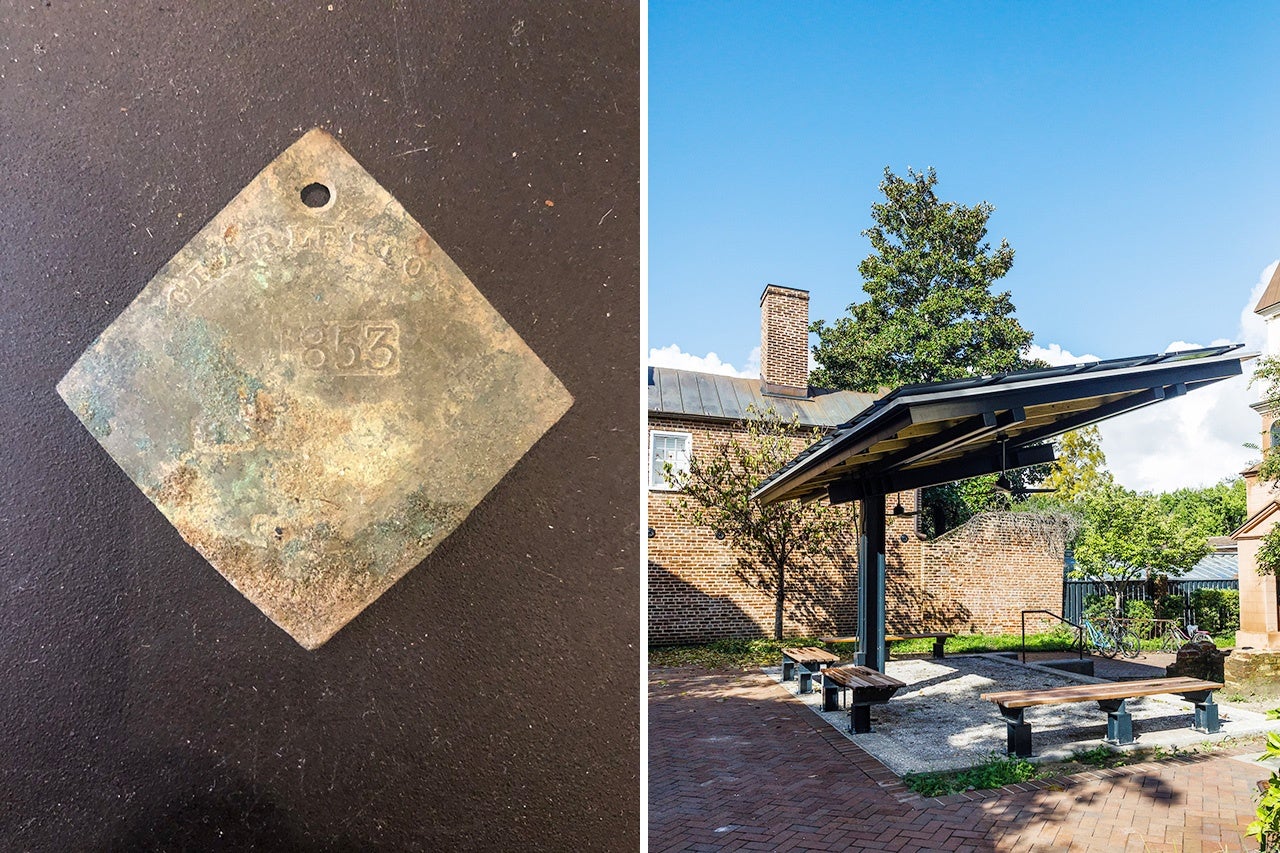Above: A slave tag from 1853 (left) was found last spring during an excavation for the installation of a new solar pavilion (right) near Rivers Green.
The College of Charleston campus community is invited to attend an unveiling for a new solar shade pavilion near Rivers Green and to commemorate the Indigenous and enslaved people who labored and lived near the site throughout history. The event, titled “Uncovering History/Making History,” will take place at 10 a.m. on Oct. 15, 2021, at the new pavilion located behind 65 Coming St. near the Pi Kappa Phi Bell Tower. Face masks and social distancing are strongly encouraged. The event will be recorded and made available for viewing on the College’s website.

Student volunteers assisted in an archaeological excavation of the site for the new solar pavilion on the College of Charleston campus.
The solar pavilion project took on greater significance when CofC students and faculty discovered a slave tag, among other historical artifacts, during an archeological excavation of the site last spring. Since the pavilion project was partially funded with a federal grant from the U.S. Department of Energy through the S.C. Energy Office, the College was required to conduct an archeological excavation of the site prior to construction of the pavilion, which is strategically located along the CofC campus tour route where prospective students and their families can take advantage of shaded seating, solar-powered fans, electrical outlets and charging stations. The pavilion is completely powered by solar energy from 16 solar panels. The facility is also offsetting about 15% of the energy needs for the College’s Spanish-language house Casa Hispana, located nearby on Bull Street.
“The new solar pavilion on campus embodies many of the themes and core values articulated in our strategic plan, Tradition & Transformation. During the construction phase, our faculty and students led an archaeological dig and uncovered a slave tag – a physical reminder of Charleston’s painful history of relying on enslaved labor for its wealth and prestige,” says College of Charleston President Andrew T. Hsu. “The dedication ceremony of the solar pavilion allows the campus community an opportunity to recognize the enslaved people who built our city and also honor their memories and contributions. Out of that dark chapter of Charleston’s story, I am proud to say that we now bring light.”

The solar pavilion is powered by 16 solar panels, which generates energy for two fans, electrical outlets and charging stations.
The slave tag that was discovered will be on display at the event along with other artifacts from the 1700s to the 1800s, such as a hearth, animal bones and pottery. In use from the 18th century to 1865, a slave tag is a small, copper-alloy object that served as a permit to work. Each tag was stamped with a date, occupation (fisher, servant, porter, etc.) and registration number and was used as proof that the slaveholders had registered the enslaved person with the city to work for someone else so that taxes and fees could be collected on their labor. A slaveholder was legally entitled to all the wages earned, although some enslavers permitted laborers to keep their wages. (Editor’s note: Some historians, institutions and museums also refer to these metal tags as slave badges.)
In conjunction with the event, the Avery Research Center for African American History and Culture and the College of Charleston Libraries Special Collections are planning to exhibit a collection of slave tags inside Addlestone Library. The exhibit, titled “Artifacts of Oppression,” will include slave tags for a servant, a porter and a mechanic as well as one free tag plus a sculpture by artist Shirley McWhorter-Moss titled “A Way Out,” all from the Avery Research Center’s collections.
Also on display at the event will be a mockup of a proposed permanent sign for the pavilion site. The sign features a summary of the site’s historical significance and a QR code that links to an essay housed on the College of Charleston history website Discovering Our Past.
In addition to remarks from President Hsu, several members of the campus community will speak at the event, including:
- The Rev. Leondra Stoney ’02, pastor of Greater Howard Chapel AME Church, along with CofC student and Edisto/Natchez-Kusso Tribe member Sarah Creel and Winne Mraz and Cathy Nelson, elders of the Edisto/Natchez-Kusso Tribe, will deliver a “Land and Labor Acknowledgment”
- John Morris, vice president for facilities management
- Grant Gilmore, associate professor and Addlestone Chair in Historic Preservation
- Ronald McKelvey, Maintenance Shop supervisor and poet, will read one of his poems
- Members of the CofC Concert Choir and Gospel Choir will sing the second verse from “Lift Every Voice”
Numerous campus groups, academic departments and centers will be represented at the event, including the Archaeology Program; the Avery Research Center for African American History and Culture; the Center for the Study of Slavery in Charleston; the Center for Historical Landscapes; the Committee on Commemoration and Landscapes; Addlestone Library, Special Collections; Department of Classics; Department of Geology and Environmental Geosciences; Department of Art and Architectural History; Historic Preservation and Community Planning Program; the Southern Studies Program; Facilities Management; and the Center for Sustainable Development.




